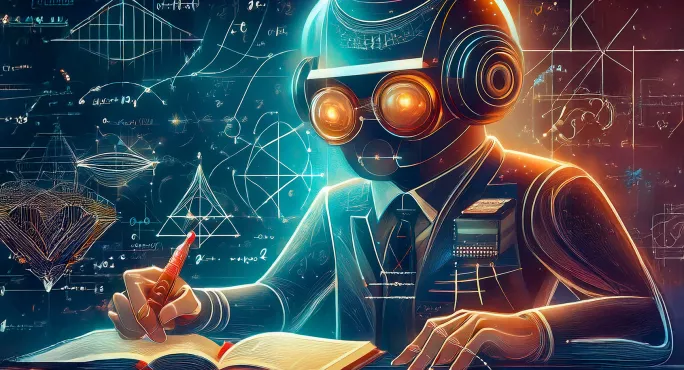
- Home
- Teaching & Learning
- General
- How thoughtful use of AI can give teachers ‘incredible value’
How thoughtful use of AI can give teachers ‘incredible value’

Two years ago, I became interested in using artificial intelligence (AI) in education. Initially, I focused on straightforward tasks such as creating worksheets, generating solutions, writing letters and preparing homework. It quickly became an “admin assistant” on my computer, saving hours each week by streamlining daily tasks.
Beyond routine work, I found AI useful for writing policy and course outlines, which inspired me to explore its potential further.
Producing answer sheets was my next step. Although this required clear instructions, with practice I learned to communicate effectively with ChatGPT to produce accurate answer sheets. As I improved at guiding the AI, it became a reliable resource, delivering materials ready for immediate use.
This success led me to wonder whether AI could grade student work. As a maths teacher, I found it challenging at first to input written maths answers into ChatGPT. By using voice dictation to transcribe answers, I found that while the method had some limitations, it mostly worked well.
AI in assessments
Curious about how it might perform in other subjects, I began testing it with text-based assignments by inputting marking schemes alongside essays. Working with colleagues, we found that ChatGPT’s grading often aligned with human evaluations, showing surprising consistency across different subjects.
Inspired, then, by the potential for AI in assessments, I explored its use in providing individualised feedback. By analysing homework or test responses, I could identify areas where students were struggling.
ChatGPT then generated personalised “tutor sheets,” including summaries, worked examples and practice problems tailored to each student’s needs. Students found these sheets especially helpful, as they focused on specific areas of difficulty rather than a one-size-fits-all review.
In addition, ChatGPT enabled me to create individualised tests for students. I was then able to generate unique questions at an equivalent level of difficulty for each student, minimising the chances of sharing answers while maintaining a fair standard of assessment. Students appreciated this approach, and it introduced a new level of fairness and integrity to assessments.
- Related: Teachers ‘sceptical’ of AI benefits in schools
- Teacher workload: AI to help teachers mark homework and plan lessons
- Edtech: AI ‘could create new inequities in learning’
My exploration didn’t stop at assessments - I wondered how AI could support teacher development. Recording my classes, I used ChatGPT to evaluate them against our school’s teacher evaluation criteria. Although initially sceptical, I was genuinely surprised at the insights it provided.
AI could objectively analyse key aspects of my teaching, providing constructive feedback on areas such as questioning techniques and lesson structure. In fact, after analysing about 15 lessons, I noticed a pattern: I was investing more energy in lower-ability classes than in higher-level groups, a revelation that led me to adjust my approach.
AI’s feedback encouraged me to refine my teaching methods, and I now advocate for other teachers to try using AI for evaluation, as it can be an eye-opening experience.
Educational simulations using AI
My journey took an unexpected turn when I was introduced to a specialised AI platform for educational simulations. During a history lesson, AI played the role of Nikita Khrushchev in a simulated Cuban Missile Crisis scenario, and students, working in groups, had to respond strategically.
This interactive roleplay engaged students in a way that allowed them to apply their knowledge in a high-stakes, realistic context, bringing history to life and illustrating the power of AI as an interactive classroom resource. I am now looking at how AI might help pupils self-evaluate their learning again with some interesting results.
Overall, I have come to see AI as a valuable educational tool, but one whose effectiveness depends on thoughtful application. Its potential in education is vast, and we are only beginning to explore its capabilities. From automated grading and individualised tutoring to lesson evaluations and interactive learning, AI opens new pathways for engaging students, personalising learning and enhancing teaching practices.
However, we need to use it ethically and effectively to realise its benefits fully. AI is neither inherently good nor bad; it is a tool, and its impact depends on how we choose to use it. My experience has shown me that, when used thoughtfully, AI can offer tremendous value, helping teachers focus on what matters most: fostering student growth and achievement.
Derek Simpson is a maths teacher at Holy Rood High School in Edinburgh. He was previously a depute head before retiring from that role.
For the latest in Scottish education delivered directly to your inbox, sign up for Tes’ The Week in Scotland newsletter
You need a Tes subscription to read this article
Subscribe now to read this article and get other subscriber-only content:
- Unlimited access to all Tes magazine content
- Exclusive subscriber-only stories
- Award-winning email newsletters
- Unlimited access to all Tes magazine content
- Exclusive subscriber-only stories
- Award-winning email newsletters
You need a subscription to read this article
Subscribe now to read this article and get other subscriber-only content, including:
- Unlimited access to all Tes magazine content
- Exclusive subscriber-only stories
- Award-winning email newsletters
- Unlimited access to all Tes magazine content
- Exclusive subscriber-only stories
- Award-winning email newsletters



